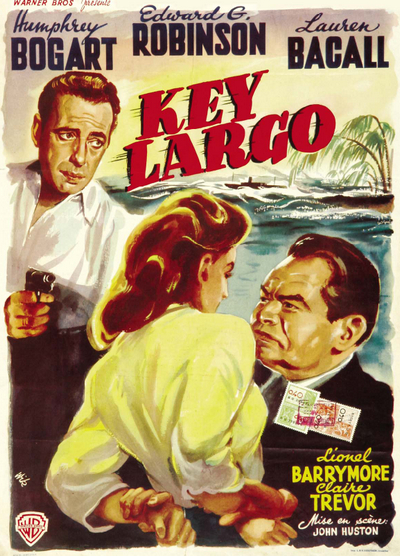Cats vs. rats in Key Largo

Key Largo, a movie in which bureaucrat Edward G. Robinson thinks Lauren Bacall is protecting criminal cats trying to catch innocent rats; Bogie sues the feds in court, saves the day, and looks dapper doing it.
When Pacific Legal Foundation‘s Atlantic Center last visited Key Largo, we learned that a busybody bureaucrat thought he could stop Mother Nature and thousands of years of evolution in the process; that is, a U.S. Fish & Wildlife Service (FWS) employee named Jeremy Dixon believed he could use the awesome power of the federal government to stop cats from chasing rats. We first wrote about this unconstitutional and ridiculous waste of taxpayer money a little over a year ago.
In lieu of clicking that last link for background, suffice it to say that there’s a rat in Key Largo that the feds have deemed “endangered.” What makes this rat different from any other disease-infested, garbage-diving vermin?
Good question.
According to a recent article in the Smithsonian Magazine, the Key Largo Wood Rat is rare and thus worthy of federal protection because it is “indigenous” to Key Largo, which I suppose means it sprung up from the fertile sands of Key Largo like a rat-version of Adam in the Book of Genesis. Also, the rat likes a particular kind of Florida wood. There’s no other rat just like the Key Largo Wood Rat in the world, according to federal law.
Unfortunately, cats don’t read federal law. They chase and kill their prey. And the Key Largo Wood Rat fits the “cat prey” category, despite its fancy name and federal protection.
Which leads to the story of Captain Spencer Slate, the local celebrity owner of a feline. The feds prosecuted Captain Slate because the feds contended his cat trespassed onto federal property to catch an endangered Key Largo Wood Rat. Slate, a well-known local scuba diver who runs a very successful business on the island, received a written citation threatening jail time when the feds captured his pet cat Rocky for allegedly wandering onto federal land.
Captain Slate did what all good men and women would like to do when faced with an outlandish prosecution by the feds—he took them on and won. Slate represented himself in federal court and the federal judge found him not guilty of having his cat roam on to federal property. In fact, Slate explained that the feds had caught his cat outside federal property by setting a trap outside the federal park, on land within a stone’s throw of his own private property. Mr. Slate’s case was later dismissed, but the possibility of the FWS’s continued overreach is ever-present as long as the federal government’s cat-catching strategy remains in place.
The recent Smithsonian article mentioned above suggests that the feds intend to continue to pursue wasting time and money on this fool’s errand of stopping cats from chasing rats. The feds have rigged up cameras throughout the park to catch cats in the act of pursuing rats. They also have spent time and money building nests for these rats, which makes one wonder whether these rats have adopted a little too adeptly to the island carefree lifestyle that the Florida Keys offer. Why build the nest if the feds will do it for you? In any event, the article is well-worth reading if you like unintentional comedy that almost reads as parody.
In all seriousness, let’s finish on this note: when FWS agents prowl off of federal land to trap private citizen’s cats on private land, these agents’ actions implicate a number of constitutional clauses, including the commerce clause, takings clause, property clause, and due process clause. PLF will continue to monitor these developments in the interest of making sure the federal officials looking for cats in the Keys don’t use their keys to lock out the U.S. Constitution.

